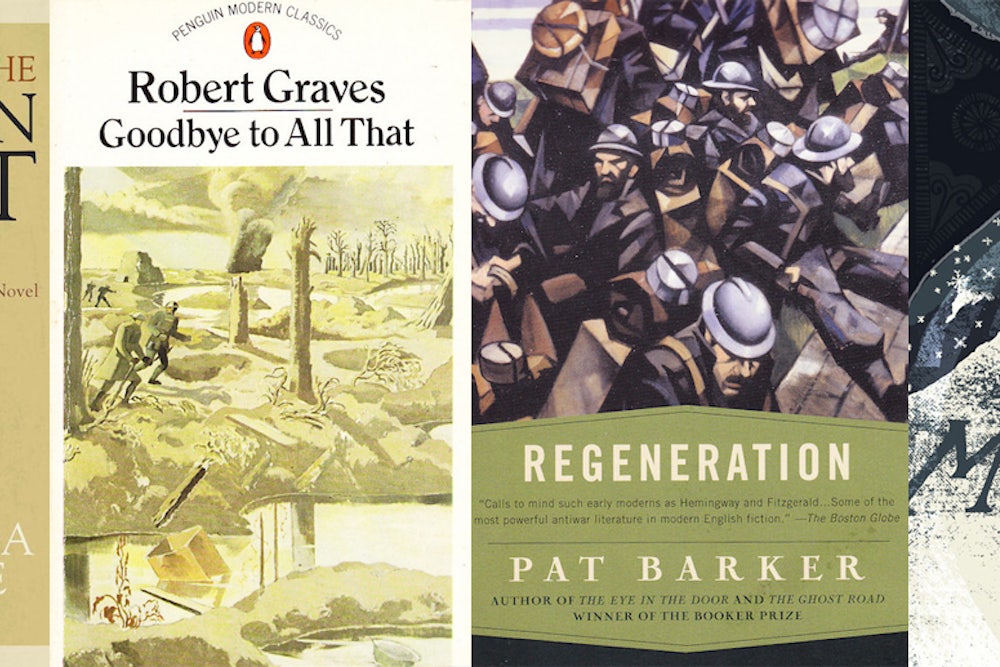
Really, you could read any Pat Barker novel (Life Class, Toby's Room, Another World) for a moving evocation of the travails of the men and women coming of age during the Great War. But her Man Booker Prize–winning Regeneration trilogy (Regeneration, followed by The Eye in the Door, and The Ghost Road)—which brings to life famed poet Siegfried Sassoon and pioneering physician Dr. W.H.R. Rivers—is by far Barker's most fascinating exploration of post-war psychology. Moving from Craiglockheart Hospital in Scotland to the streets of London to post-war France, Barker's mixture of the historical and the fictional beautifully, and hauntingly, explores the violence done to the mind even after the body is out of harm's way.

Any list of war novels would be incomplete without this classic. Unflinching in its portrayal of the banal horrors of war, Remarque trained his simple language on the moments in between the fighting, and produced one of the first twentieth-century novels (it was published in 1929) to eschew the celebratory heroics of battle. Prepare to be stunned by the modernity of this 85 year old work.

Though not as masterful as some of her other works, West's story of a shell-shocked Army Captain's return to England after serving in the French trenches prefigured much of the psychoanalytical writing of the 1920s. As the only novel about the war published during the war that was also written by a woman, it's worth the read.

Faulks's episodic novel isn't primarily set during the Great War; but its dreamy pre-war beginning lends the novel a fierce power by creating stark comparisons between the France of 1910 and that of 1917. And as one of the more successful modern tales of World War I, it gracefully reminds readers of the Europe that was lost forever.

Although most of this powerful autobiography takes place during the war, its real mastery is its examination of the domestic upheavals that arrived after 1918. The rise of feminism, the decline of patriotism, the complete reorientation of class structures: In all these things, as in his intimate reconstructions of life in the trenches, Graves has a gift for beautifully illustrating grand themes through small encounters.

Ford set himself no small task with the creation of this enormous four-part tome; he wished for no less than "the obviating of all future wars." With that goal in mind, Ford took a curious route: The novel avoids graphic imagery and eschews evocative battlefield scenes. But the tetralogy remains grim and terrifying without them—it recognizes that there are other ways to crumple men's souls.

The story of an American working as an ambulance driver for the Italian Corps, this third novel from the master of brevity was arguably his most autobiographical. It was also his first beseller—and is often considered the most artful American novel to emerge from World War I.

Mann famously paused his writing to reframe this massive, pensive novel after the onset of the war, a decision that profoundly affected The Magic Mountain's scope. One can hardly imagine the novel without its pronounced attitudes toward the destructiveness of human nature. Of course, The Magic Mountain is truly a book about everything—time, love, existence, etc. etc. etc.—but its deep meditation on the dying young must be read as a response to the horrors of the Somme.

Even though the modernist's most lauded novel takes place in a single day well after World War I, and even though its main character is a well-heeled female socialite, Woolf's evocations of post-war London and all its accompanying anxieties (that plane circling the streets!) paints one of literature's most perfect portraits of the Great War's effects on society as a whole. What's more, the resolution of Septimus Smith's storyline is one of the most chilling and brutal in all of literature.
